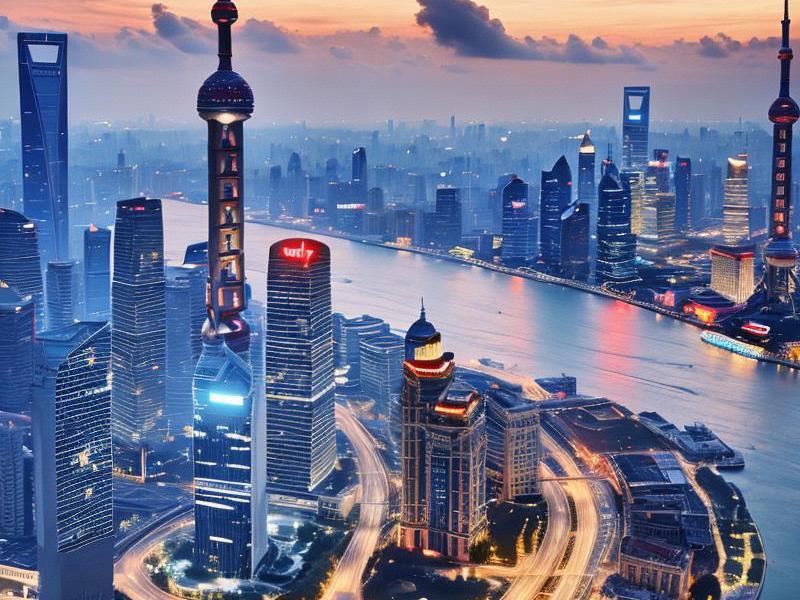
Shanghai, often referred to as the "Pearl of the Orient," stands as a testament to China's rapid urbanization and economic transformation. As the financial and commercial heart of the country, Shanghai is home to the world's busiest container port and a leading global financial center. The city's skyline, dominated by iconic skyscrapers such as the Shanghai Tower, the Jin Mao Tower, and the Oriental Pearl Tower, symbolizes its status as a modern metropolis.
The economic prowess of Shanghai is evident in its bustling financial district, known as Lujiazui. This area houses the headquarters of numerous multinational corporations, stock exchanges, and financial institutions. The Pudong New Area, once a rural landscape, has been transformed into a symbol of China's economic reform and opening up to the world. With its advanced infrastructure, state-of-the-art technology parks, and business-friendly environment, Pudong continues to attract foreign investment and drive innovation.
Shanghai's economy is not solely reliant on finance and trade; it also boasts a thriving manufacturing sector, particularly in high-tech industries such as information technology, biotechnology, and new energy. The city's strategic location along the Yangtze River Delta makes it a key player in regional and global supply chains. Additionally, Shanghai's ports and shipping industry are vital to China's international trade, connecting the country to markets around the world.
Beyond its economic achievements, Shanghai is a cultural melting pot that reflects the diverse heritage of China and the world. The city is renowned for its historical architecture, with landmarks such as the Bund, a waterfront promenade showcasing colonial-era buildings, and the Yu Garden, a classical Chinese garden that dates back to the Ming Dynasty. These sites offer a glimpse into Shanghai's rich history and its role as a gateway to the West.
上海龙凤419贵族 Shanghai's cultural scene is dynamic and inclusive, with a vibrant arts community, world-class museums, and a thriving music and theater scene. The city hosts numerous cultural festivals throughout the year, including the Shanghai International Film Festival, the Shanghai Fashion Week, and the Shanghai Spring International Music Festival. These events attract artists, designers, and performers from around the globe, contributing to the city's reputation as a cultural capital.
The Shanghai Museum, located in People's Square, is a must-visit destination for art enthusiasts. It houses an impressive collection of Chinese art, including ancient ceramics, calligraphy, paintings, and jades. The museum's innovative exhibitions and educational programs make it a popular attraction for visitors of all ages.
Shanghai's culinary scene is another aspect of its cultural identity, offering a fusion of traditional Chinese cuisine and international flavors. From street food vendors in the bustling markets to Michelin-starred restaurants, the city's dining options cater to a wide range of tastes and budgets. Dishes such as xiaolongbao (soup dumplings), shengjianbao (pan-fried dumplings), and baozi (steamed buns) are local favorites, while international cuisines can be found in the city's many expatriate communities.
In addition to its economic and cultural significance, Shanghai is a city with unique geological features that have shaped its development and identity. Located at the mouth of the Yangtze River, Shanghai is situated on the alluvial plain formed by the river's sediment deposits. This geographical advantage has made Shanghai a natural harbor and a hub for trade and commerce.
上海龙凤419会所 The city's coastal location also exposes it to the challenges of rising sea levels and extreme weather events, such as typhoons. To address these issues, Shanghai has implemented various measures to enhance its resilience, including the construction of seawalls, the development of flood control systems, and the promotion of sustainable urban planning.
Shanghai's geological history is closely tied to its position on the Pacific Ring of Fire, an area prone to seismic activity. While the city itself is not located in a major earthquake zone, it is not immune to the potential impacts of seismic events. As a result, Shanghai has invested in earthquake-resistant building standards and disaster preparedness measures to ensure the safety of its residents.
The city's urban development is a remarkable feat, with a population exceeding 24 million people. Shanghai has successfully balanced rapid growth with the preservation of its historical and cultural heritage. The city's master plan emphasizes sustainable development, green spaces, and efficient public transportation. The Maglev train, which connects Pudong International Airport to the city center, is a prime example of Shanghai's commitment to innovation and environmental sustainability.
上海娱乐 Shanghai's global influence extends beyond its economic and cultural contributions. The city plays a pivotal role in international diplomacy, hosting numerous global summits and forums. The G20 Leaders' Summit, the Belt and Road Forum, and the World Expo are just a few examples of the significant events that have taken place in Shanghai, highlighting its importance on the world stage.
As a global city, Shanghai is a hub for education, research, and innovation. The city is home to prestigious universities such as Fudan University and Tongji University, which attract students and scholars from around the world. Shanghai's research institutions and technology parks are at the forefront of scientific discovery and technological advancement, driving China's transition to a knowledge-based economy.
In conclusion, Shanghai is a metropolis that embodies the spirit of China's modernization and globalization. Its economic might, cultural vibrancy, and geological significance make it a unique and dynamic city. As Shanghai continues to grow and evolve, it remains a beacon of opportunity and innovation, shaping the future of China and the world.
